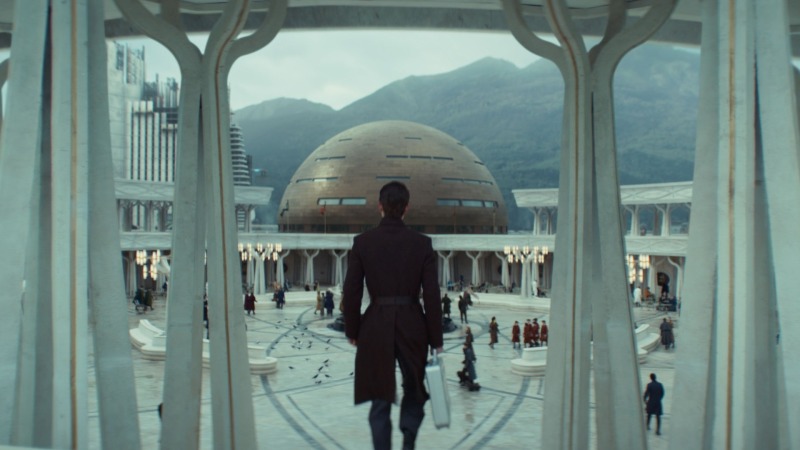Andor’s Sanne Wohlenberg and Genevieve O’Reilly Unpack the Huge Season 2 Ghorman and Senate Arcs


For Star Wars fans who have engaged in the larger universe through licensed Star Wars Legacy publishing and official roleplaying games, the events that transpired in the Ghorman Massacre were already well known. However, Andor Season 2 is the first time that major incident in Star Wars canon has been portrayed in a live-action project.
It all but guaranteed the start of the Galactic Civil War and has long been part of Mon Mothma’s backstory because of her outspoken reaction to it in the Senate, and subsequent labeling as a traitor by the Empire. In the latest trio of episodes—“Messenger,” “Who Are You?”, “Welcome to the Rebellion”—directed by Janus Metz (True Detective) and written by Dan Gilroy, the massacre and that seminal moment in the Senate get their spotlights.
In particular, “Who Are You?” is a massive episode that rivals any Star Wars film in terms of its production value, battles and huge turns for the ensemble characters, both Rebel and Imperial. In this week’s exclusive Andor Season 2 postmortem, executive producer Sanne Wohlenberg and Mon Mothma actress Genevieve O’Reilly share their thoughts on the Ghorman Massacre and the Senate escape episodes. And for more on Andor‘s excellent second season, read part one and part two.
Note: This interview has been edited for length and clarity.
Paste: In this block of episodes, Yavin is now the home base for the more formalized Rebellion. Since this is a familiar place in the canon, were there any set pieces or materials you could repurpose from past productions?
Sanne Wohlenberg: There were, of course, certain bits that we knew from Yavin to Rogue One. Andor has the chance to expand on it and actually show more, which, I think, gives us the extraordinary possibility to see how it slowly but surely [grows] as the army forms and the Rebel Alliance really finds a way to organize themselves from having been more disparate groups. It comes together, to really show bits of that as it was developing beyond what we had seen before and it was just a real gift.
As for recreating, nobody stores things, especially large sets, because you may or may not come back for it. There are always some bits that will be stored in there, because they could potentially find use, or are a key element across the shows, but really, not that much. But we couldn’t disappoint with what we had seen before, so we had to make sure we could recreate that. We’re just incredibly blessed with a [production] designer like Luke Hill. He’s working very closely with Tony, even on the development of it, so for things that we know we can’t achieve, [he offers] “we could do this?” Or, “when I give you this here, could it be reset?” There is a constant conversation as the directors prep just under four months to really hone down what we need to shoot exactly what it is. You can’t afford on the small screen, with this pace that we are shooting at, to come on set and see and find it there. You really have to plan for every prop that has to be made and every costume that has to be made. You really need to hone that down in order to know you have the formula to deliver what the story requires with the detail and care and attention, in order to make this real.
Paste: In “Messenger” audiences finally get to see Cassian and Bix building a life together in Yavin. It’s the first time we’re seeing them have some peace together even though the war is impending.
Wohlenberg: You cannot tell a story as big and adventurous as this without ordinary people finding themselves caught up in extraordinary circumstances in very pressured conditions. They choose through their beliefs that it is possible to form resistance and to change the path of history and the galaxy. It isn’t only the action set pieces and the spying and the dangerous situations that people find themselves in. It is a very human story. We’re very much on the ground with people from both sides of the fences. In Season 1, we always knew that Bix and Cassian had a history. The idea of going forward into Season 2 without love and a romance would just seem not emotionally satisfying. Your friends, your family ties, your emotions, they do not park and get stopped just because you find yourself caught up in a resistance. It is just such a beautiful, very truthful and incredibly relatable storyline. We’ve always dared to go to “the kitchen” because we have the time. Why not go to Bix’s and Cassian’s and you see these two people in whatever situation they’re caught up in? They have a home. They’re trying to build a home. They have been displaced. They have been traumatized and with that comes difficult relations. I think it’s inevitable for us to show that when you really tell the story of their hope and their sacrifice.
Same as you’re getting to know Syril and Dedra. They certainly have a very complex relationship, that is not an easy one too. But it’s so human.
-

-

-

-

-

-

-

-

-

-

-

-

-

-

-

-

-

-

-

-

-

-

-

-

-

-

-

-

-

-

-

-

-

-

-

-

-

-

-

-








































